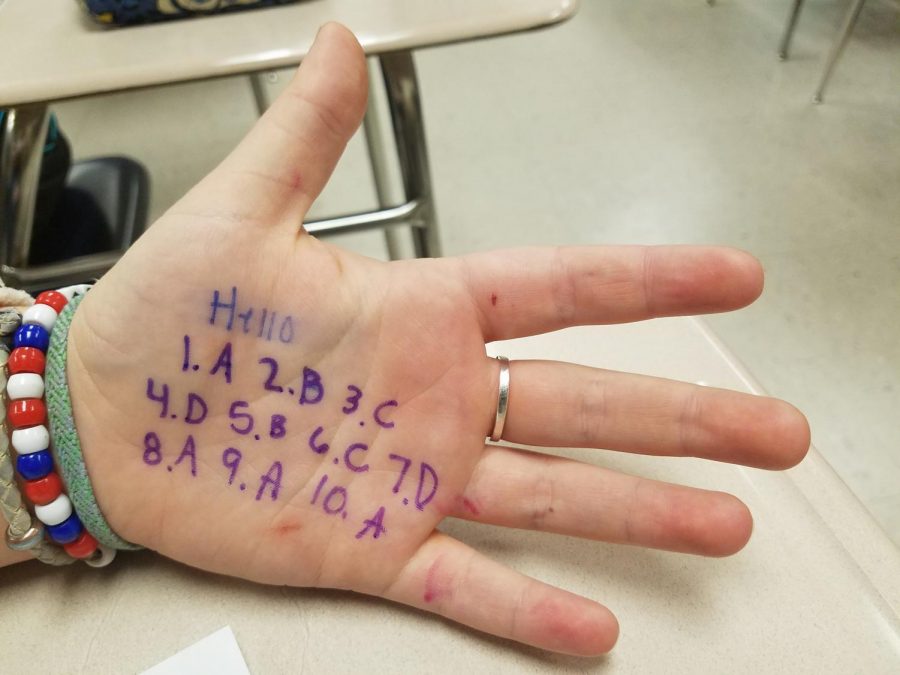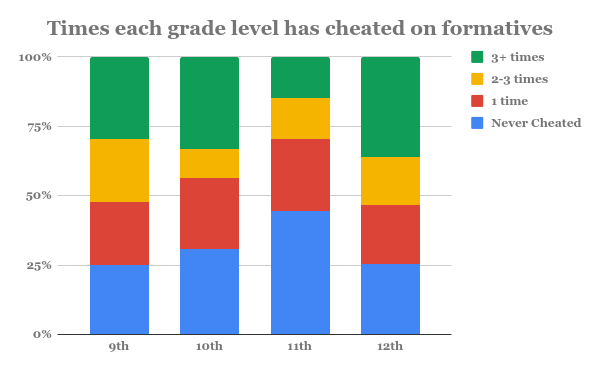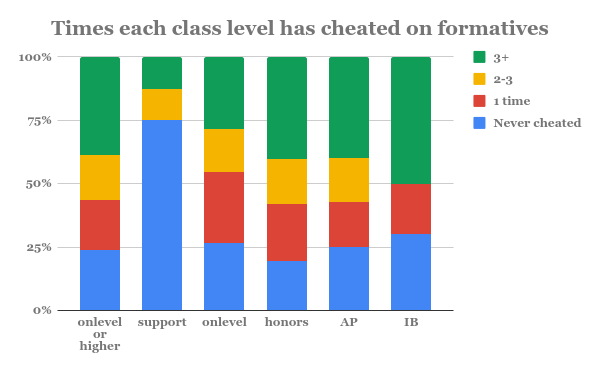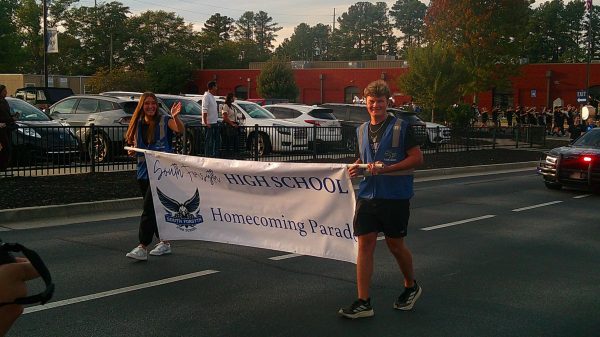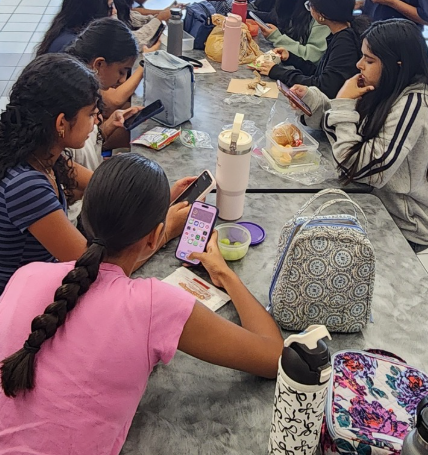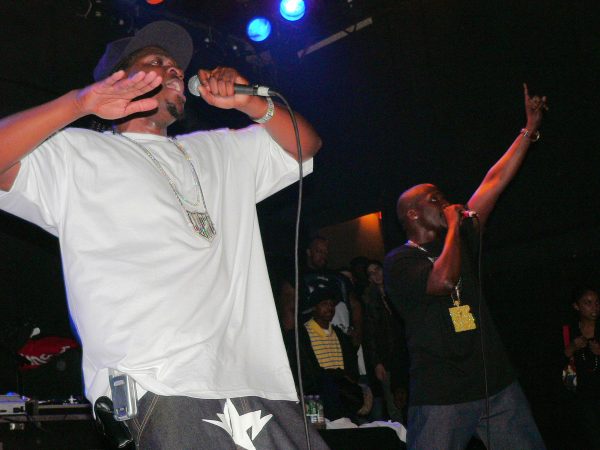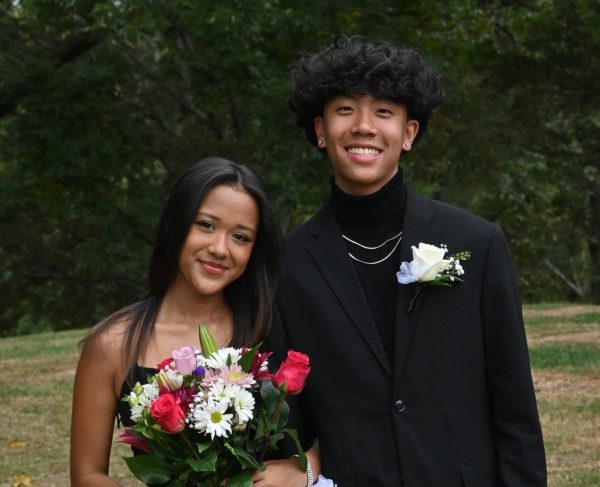Trends in academic dishonesty at South Forsyth High School
Using the hand, not the head. Cheating is just cutting corners, students need to find better methods to prepare themselves for the future. Students who cheated through high school have found that their lack of retained information is detrimental to how their lives will play out after high school.
It’s been a long, rough year for just about any student who has to multitask their lives. Jobs, family, extracurriculars, and preparing for colleges all alongside having to worry about grades in classes are some of the stressors students can face on a day-to-day basis. Most students are able to find a balance. For those who can’t, cheating and academic honesty are tempting shortcuts to help keep their grades up while juggling their other responsibilities. Cheating is wrong, but for desperate students, it seems like the only choice they have.
“I do not encourage students to take classes they can’t handle with their upcoming schedule, because it would impact them negatively,” says Mrs. Hutfiltz.
Research from an article published by the Atlanta Journal-Constitution in 2016 titled, Student cheating appears to be increasing, describes how cheating is on the rise. Author Janel Davis reviews research he found which insinuates cheating has been rising by more than 3.5 percent since 2012. He dives into records of reported academic dishonesty in the University of Georgia and shares that in 2014, cheating rose by 24 percent. He then discusses situations where students have cheated, giving examples of in school cheating as well as cheating involved in online schools. Finally, he proceeds to go on saying that Gwinett county held approximately one-quarter of all academic dishonesty complaints made in the state of Georgia in 2016 while Henry county had zero recorded complaints for three years straight.
We surveyed over 200 students via an anonymous questionnaire about student behaviors and academic dishonesty. The survey asked for the student’s grade level, gender, class levels, the frequency which they cheated on summatives and formatives, as well as ways they cheat. It took two semesters to organize and graph the data received. In the end, the survey had 66 females and 119 males (Fig. 1-2). To prevent the information from appearing skewed, due to most of the entries came from males, percentages were used for each individual variable in the charts below.
“The kids participated and understand but they also said students are doing anything to get the best scores,” said Ms. Lauer, an AP science teacher. “One student said he felt like people did not care what he learned-just what his score was and if it was low, then he felt horrible.”
Sofo Social Emotional Learning held a lesson describing the Honor Code here at South Forsyth. The lesson goes into highlighting the virtues of honesty and academic dishonesty. Tom Wolff, the honor code enforcer, even published a song called The Long Cut on Youtube to convince students to do the right thing and not cut corners. The song’s lyrics describe a student who’s contemplating cheating before it goes on to the persuasive ending portion of the song. However, not all students can be persuaded out of cutting corners as the resulting data shows.
The first two pairs of pie charts represent the split between females and males who have cheated on formatives and summatives. When referring to the data collected, females cheat 6.9% more than males overall. Meanwhile, males cheat 7.3% more than females for at least one time on formatives. Females cheat 14.3% more than males who cheated on formatives over 3 times (Fig 3-4). In regards to the statistics for cheating on summatives, the survey found that females cheat more than males by 5%. But males who cheat more than 3 times on summatives will cheat 2.1% more than females (Fig 5-6). These results included every grade level and every class level, so this reflects the individuals themselves and opens up for some debate as to why females seem to resort to cheating so much more often than male students.
“Allowing test corrections is something that I find helpful…instead of cheating, the majority will choose to make corrections [I give for a quarter of a point per question] then they actually have to look the material up and they know it is not the end of the world. I also try to throw in some projects as the kids feel they have more control over their grades in a project…” said Ms. Lauer. “They want the best grades as that is what appears to them as most important, not necessarily the learning.”
A report from Kimberly A. Geddes dives deeper into why students cheat. They specifically look at gifted and high achieving students recording polls and replies from students to describe the motivations and the rate of which cheating occurs from the group they surveyed. The highest area of cheating behavior was that 90% of their surveyed group would copy homework from others. For each of the three areas for motivations for cheating (academic, nonacademic, and neutralizing attitudes) the highest percentages they found were from: the school workload was too heavy, helping a friend, an unexpected opportunity arose, and the instructor wasn’t watching carefully. Their reading is concise and well throughout six pages describing their findings and method of investigation.
Turning away from gender, statistics were collected for each of the four grade levels asking the same questions as the previous set of data. The results for the frequency that each grade level cheats on formatives came out as seniors cheat the most on formatives with approximately 30% that cheat over 3 times. Junior year appears to be the year when students cheat the least in comparison to any other year (Fig. 7). Looking at the findings, not many people cheat on summatives, but it appears that seniors once again will try to cheat at least once. Then freshmen will cheat more than three times on a summative, which is ironic because freshmen, according to this survey, take the most AP classes (Fig. 9). Also, 11th graders will cheat the least when compared to other grade levels with approximately 85% of students who have never cheated on summatives before (Fig. 8).
“Homework should be for furthering understanding or researching a topic that students are learning about, going over class materials to be sure of understanding. Personally, I like to see students collaborating–here at South they know how to do that–but they must know that while they may discuss something like homework questions–answers need to be in their own words. Also, homework should not be a big grade. Some need more at home review than others,” said AP science teacher, Ms. Lauer.
Grades have become a huge determining factor in today’s world. Good grades grant you colleges, scholarships, and jobs, so it’s easy to imagine that desperate students will go to unfair measures to ensure their futures are safe. This worldwide issue has struck even the most unlikely places, as shown with one article published by the National Public Radio. Their article said that missile officers in the F.E. Warren Air Force Base had a major cheating scandal in 2014 when nine officers were relieved of their duty for being caught sending each other test answers. Lieutenants gave quotes sharing that if a student had a 90 then they were described as a ‘D’ student because in their field, perfection is the standard. This event did result in a change within how they test their officers, turning away from paper tests and now using practical exams to test officers without the fear of grades.
The most amount of AP students can be found in freshman year. After freshman year, seniors have the second most amount of AP students and the highest amount of IB students and on-level students. To test the correlation between class level and academic dishonesty, the survey contained a poll for what class levels each participant was a part of for that year. The survey revealed that IB students will cheat the most on formatives with 50% of IB students having cheated more than 3 times. It appears also that support students will cheat the least. On-level and honors students will attempt cheating on formatives at least one time (Fig. 10). Looking at the summative side of the surveys, the class level that has cheated the most in comparison to any other class are those in an honors class. 25% of honors students surveyed cheated on summatives over 3 times. This is the same for support students, but because there was not a great majority of support students who took the survey, there isn’t enough data to confirm that number. So in order of who cheats the most over three times on summatives, it’s honors students, AP students, on-level students, then IB students (Fig. 11). The higher level the class positively correlates with the amount of cheating they do, which may come across as a surprise since the rigor in these classes are so different, but the stress on the shoulders of the students may be the same because few on-level students will take solely on-level classes.
“I let my child know that as long as they work hard and do the best they can then that’s good enough for me. If a parent puts a lot of pressure on the child then they don’t help them, which then yes, parents should be held accountable,” secretary Melissa McCance said.
Finally, students were asked how they would cheat if they did cheat. Their answers included: using a phone, cheat sheets, social media, the internet, looking at other’s work, copying, and working together. Shockingly, despite how much students are prone to using social media, this sector comprised the fewest responses; meanwhile copying and working together were the largest. Following copying and working together was the use of the internet, then behind that was using a phone, looking at other’s work, and cheat sheets (Fig. 12 – 24). Judging from this data, it pushes teachers to find new methods of reigning in academic dishonesty.
“The honor code is enforced to be a positive thing. To be more of a positive educational experience. To make people and kids aware of what they were doing. To make it more of a positive growth experience than anything else,” assistant administrator Tom Wolff said.
From the University of Maryland, a guide is given for teachers on how to prevent academic dishonesty and how to approach a student if they suspect they are partaking in dishonesty within their classroom. There is a list of bullet points emphasizing the various measures that can be taken to reduce the possibility of cheating from using the honor code to secure environments. This means students must put away their belongings, using protectors to shield test answers, and writing the honor code on each assignment.
The data collected for the various ways students cheat are displayed on pie charts along with percentages that label each slice of the pies. The first pair of pie charts compare males to females in their methods and the results were male students will cheat by using the internet, looking at other’s work, and copying. Female students use working together, cheat sheets, and their phones. Females will cheat by working together 2.9% more than males will when they work together. Meanwhile, male students will cheat by using the internet 2.1% more than females who cheat by using the internet (Fig. 12 – 13). Following genders, figures 14 through 20 display how each grade level prefers to cheat. This data reveals how with each oncoming grade level, students will reject working together and turn towards cheating that doesn’t involve working with other students. Seniors will copy, use cheat sheets, and look at other’s work the most, while juniors use the internet and their phone the most to cheat. 10th graders work together the most, but 10th and 9th graders were almost tied for the using social media, with a .1 difference in the 10th graders’ favor (Fig. 14 – 17). Finally, the results for each class level was the on-level students cheat the most by copying, honors students cheat the most by working together, support and honors kids use the internet to cheat the most, AP students look at other’s work the most, support and IB kids use social media the most to cheat on assignments, IB students use cheat sheets the most to cheat on assignments, support and IB kids use their phones to cheat the most (Fig. 18 – 24).
“It’s really more important to be an honest person than at any cost, cheating to get a high grade. Sometimes I feel like that hasn’t been stressed enough,” Mr. Wolff said, “I think just for the justice of it and fairness, I think it’s appropriate for students to report [academic dishonesty] primarily for that reason. Not to hurt the other person, but it’s just not right.”
After a long analysis of this data, some important points to note are that a lot of students cheat in every class level and every grade level, but those who cheat the most are honors students, freshmen and seniors. Also, students most often cheat via working together, copying, or through the internet. South Forsyth High School is one of the most ambitious schools in Georgia with a wide variety of students, staff, and courses to participate in. Though through this school’s strive to push students to their best self, some students get too tied up and take on more than what they can manage.
“I worry that I will miss the cheating somehow–the kids are much better at that now than ever before and the pressure for getting high grades is more than ever before. I would hate to have a kid do great on a test and I think the student knows the material but I find out that that is not the case.” said AP science teacher, Ms. Lauer.
A similar investigation was recorded by bestcollegereviews.org, which looked at both high school and college students and evaluated ways students cheat, the demographics of cheaters, reasons students cheated, and how teachers would prevent cheating in their classrooms.
Lauren Holiday is a senior at South Forsyth and the News Editor of The Bird Feed. She is an inspired and passionate artist with big hopes for her future. Lauren is an art enthusiast who studies many popular online artists and writers to improve her own works. The reasoning behind additionally having interest in journalism is that she believes fiction stories need to have a relevance to the world today in order to tell a meaningful message. So while it may seem that she’s lost in fantasies with dragons, ghosts, robots, and talking animals, she’s actually plotting to advocate for her opinions in the most creative way. Ultimately, Lauren hopes to introduce new and controversial thoughts to the school to make the best out of her last year in The Bird Feed journalist class.
If you want to contact her then refer to her email: [email protected]



